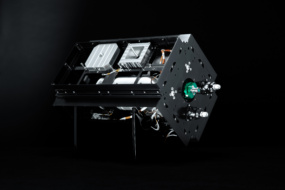TechStars LA has announced its September cohort. This year, seven of the twelve total companies joining the startup accelerator hail from aerospace.
TechStars: The startup accelerator began in 2019 with the vision of connecting the innovative technology developing as part of the growing new aerospace industry in LA with the DoD. “I saw an opportunity to build something very specifically focused on the aerospace and defense sector,” said Matt Kozlov, managing director of TechStars LA. “Not just to build whatever the Air Force needs, but to bring in commercial, civil and military space into one community.”
Of the first cohort of 10 companies, seven have now raised between $10 and $40M. The accelerator leverages its relationships with the Air Force, Space Force, NASA, and the primes to connect its cohort companies with mentors and help them to find contract opportunities.
The next generation: When picking companies to join the next cohort of TechStars, the team had to stand out. The new cohort came in with strong ideas to fill a need and with the professional backgrounds and heritage to make it happen.
“Not only do I have to like the team and like the overall business, I need at least one of the people we’re working with at Space Force, NASA, JPL to say, Yeah, that’s really compelling. That’s technically unique. That’s feasible,” said Kozlov.
The September aerospace cohort:
- Additive Space, which builds aerospace products using additive manufacturing
- Canopy Aerospace, which build heat shields
- Charter Space, which is building a software logistics platform for satellites
- Fenix Space, which is focused on cheap launch services
- In Orbit Aerospace, which is building uncrewed space stations for in-space manufacturing
- Infiltron, which focuses on cybersecurity
- WingXpand, which builds drones with extendable wings
Catching Up with In Orbit
The founders In Orbit Aerospace, Ryan Elliott and Ishaan Patel, spoke with Payload about the company’s approach to in-space manufacturing. The team closed an $850,000 pre-seed in July and has been focused on testing and validating parts of what will ultimately become its flight system.
Elliott, the company’s CEO, said that the lack of infrastructure for manufacturing in space is the biggest hurdle for getting started. “It’s hard to get things out there and it’s hard to get things down,” said Elliott.
The big idea: Solving the infrastructure problem for research and in-space manufacturing. The company’s vision is to launch an uncrewed space station, reachable with a reentry vehicle. The system would launch the reentry vehicle on a rideshare with raw materials, dock with the station, conduct its research or manufacturing in zero gravity, and return finished products to Earth.
Long term, the team envisions a constellation of these uncrewed space stations, and launching reentry capsules weekly by the end of the decade.





